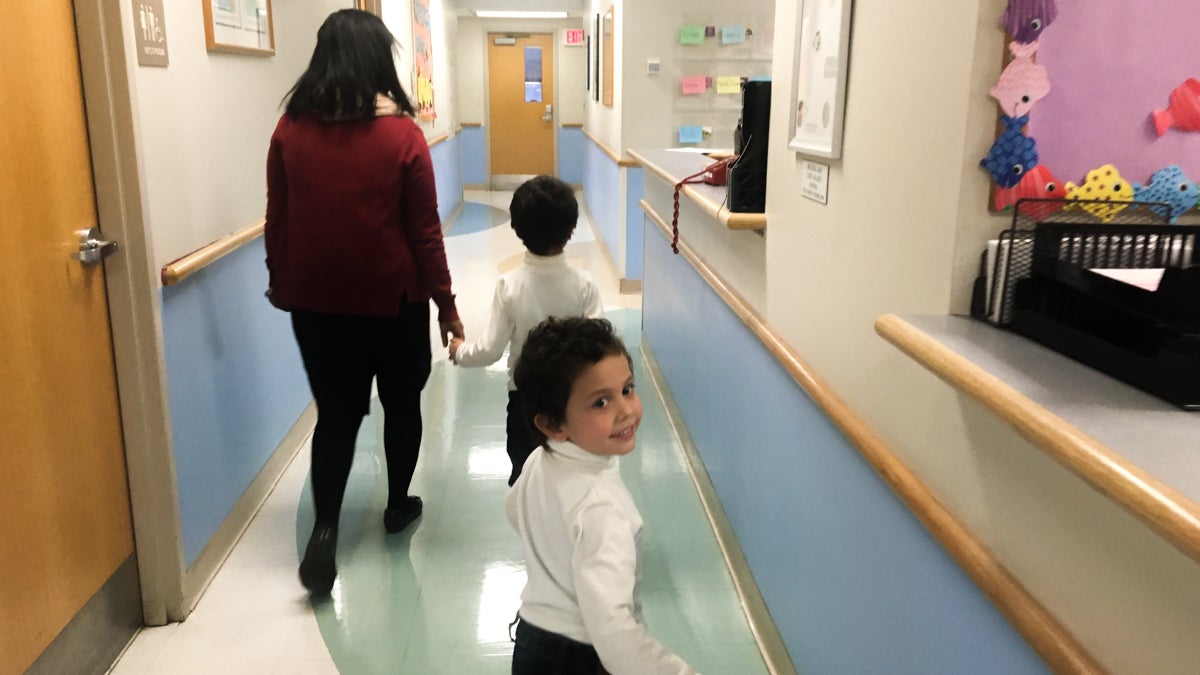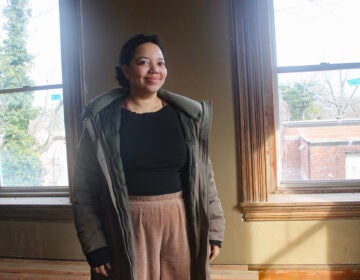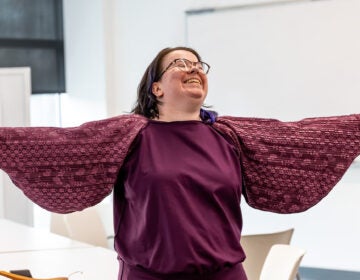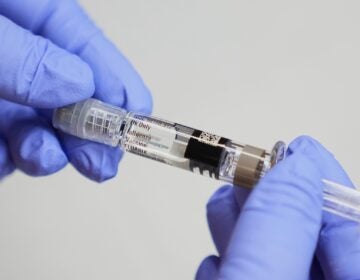For these Syrian refugees, smiles and tears fill the doctor’s office
Listen 7:07
The Taweels arrived in the U.S. in January as Syrian refugees. Shortly after, they went to Einstein’s pediatric clinic for their first comprehensive health exam in the U.S. Dr. Raghava Kavalla walks with the two boys, 6-year-old Ghassan and four-year-old Anas, to an exam room. (Elana Gordon/WHYY)
For four years now, the pediatric wing at Einstein Medical Center in North Philadelphia has blocked off Thursday mornings to meet with refugee families. On this mid-February day, they’re prepping to see the Taweels. The family of five is originally from Syria. They made it to the U.S. in January and are here for their first comprehensive health visit.
As they wait in a spacious exam room, the 10-month-old girl giggles while the two boys, four and six years old, sit in seats too big for them and flip through books about colors and shapes. The two look up, curious, when Dr. Raghava Kavalla enters the room.
“This is the first visit for all three of the kids, so I have a lot of questions,” Dr. Kavalla says with a gentle smile to the mother and father through an Arabic interpreter. The parents nod and the father, Osama, who’s 29, responds that they too have a lot of questions.
Of the more than 80,000 people who found refuge in the U.S. last year, more than a third are kids, an age group that agencies like UNICEF say have been disproportionately affected by international conflict and violence. In the U.S., child refugees are usually accompanied by their parents, and one of their first steps in this newfound world is taking on something families may have long neglected: their health.
Refugee clinic director, Dr. Mayssa Abuali, says that’s why the hospital blocks off extra time, at least an hour, for these new refugee health visits. They then schedule follow-ups shortly after.
“There are a lot of issues to address,” Dr. Abuali says.
That can include everything from checking standard physical health issues to looking for signs of trauma.
“Sometimes we may not be able to address every single issue. That’s why we have frequent visits initially, until we make sure that the active health issues are under control and the vaccines are up to date.”
Before arriving in the U.S., all refugees must undergo a pre-arrival physical exam and a screening for infectious diseases by a U.S. appointed physician. Once here, families are supposed to meet with a doctor within 30 days. In Philadelphia, that on the ground connection and care is facilitated through the Philadelphia Refugee Health Collaborative, a regional coalition that formed in 2010 and includes three refugee resettlement agencies and twelve clinics, three of which treat children. Refugee status generally comes with eight months of health insurance. Most refugee kids can get coverage beyond that through avenues like the state health insurance program (CHIP).
Dr. Kavalla gets to know the family and discusses any concerns they might have before getting started on the physical exams. At one point, four-year-old Anas interjects: he stands up in his little green hospital gown, puffs out his little chest and then, sings a song.
(disclosure: this act of utter cuteness may have been prompted by this Pulse reporter holding out a microphone during the visit)
Lynda Caced, the Arabic interpreter for the visit, is also moved. After a momentary pause, she states: “Wow! This is a song, a very long song, he learned probably in school.”
The Taweels are from Syria, where the husband’s family ran restaurants and some other businesses. That little singing one, Anas, was still developing in mom’s belly in 2012, when their neighborhood in the southern Syrian countryside was bombed.
“I was not only worrying about my pregnancy, but about all the kids, all my neighbors, my family,” said Enas, the mother. “All the pictures that you may have watched on TV are really real.”
They fled their home in the middle of the night with the older brother, Ghassan, who was 18 months old at the time. They settled in Damascus, where Anas was eventually born. It was safer there, Enas recalled, but still the war raged around them. Within a year, the family moved to Egypt where they hoped it would be safer. There, they applied for help from a refugee organization.
“And one the day, the organization contacted us and asked whether we wanted to be resettled in another country, like the United States. And we said yes,” Enas said. “So after a year and half of interviews and meetings, we were able to get the papers as refugees.”
Dr. Kavalla has heard stories like these before.
“It’s very touching to see these kids here. I’m glad you are safe,” she tells them.
Here in this exam room, signs that their family may have been through more than anyone would want to imagine are subtle. The two young boys curiously look on, wide-eyed, during the visit. They’re smiling and are amenable to having their body prodded a little. But the site of blood, even when getting their own drawn, can be upsetting.
“Now when they see the blood, they get scared,” Enas said.
The father, Osama, says war is a distant memory for his children. He has tried very hard to help them forget the war and overcome any trauma “to the extent that now, the only thing they remember about the country is the name.”
Dr. Kavalla says kids respond to trauma differently at different ages. In general, staff keep an eye out for signs of nightmares and withdrawing from activities. For young ones, play therapy and distraction is really helpful. They say a key to addressing this and other health issues is developing a good rapport and a relationship with families.
Over the next 45 minutes or so, Dr. Kavalla goes over the results of the tests and screenings the children had prior to coming in. Anemia is a common concern, as are other vitamin deficiencies. They also screen for parasites and other infectious diseases. Everything is normal, Dr. Kavalla explains.
She examines each of the children, starting with the youngest, Najwa.
“In terms of her development, I can see that she rolled over just now. Is she able to sit when you hold her?”
Yes, the parents reply. She’s even starting to take a few steps.
“Oh, that’s great!” says Dr. Kavalla.
She reviews all the kids’ growth, diet and other development markers. She checks their ears, throat and reflexes. She also checks their dental health. It’s something that’s often neglected. Staff give the two boys a fluoride coating on their teeth. Next time they’ll do a vision and hearing test.
Dad, Osama, says he’s grateful.
“Wow, it’s the best compared to anything we have ever seen,” he says with a grin. “Everything is different. This is the best welcoming.”
For the next three to six months, the Taweels are set up with a health coordinator, who will help them get appointments and figure out transportation logistics, like how to take the subway. Staff here say this extra support can be critical because families might not call or visit out of fear that no one will understand them.
“I always tell them if they call, they only need to know two words in English: Arabic translator,” says Dr. Abuali. Legally, any medical provider is obligated to provide translation services, whether by phone or in person.
Beyond language barriers, others might not realize that to get medicine at a pharmacy or to see a specialist, a person has to first go through a primary care doctor. Things are different in the U.S. compared to other places.
Except one thing: vaccines.
This is routine for families like the Taweels. Before the war, Syria had a national immunization program. Staff give them information in Arabic about their kids’ vaccine schedule. They’ll need these documents to get their kids into school. Still, nothing is cool about this for Najwa, Ghassan or that previously happy four-year-old vocalist, Anas.
He breaks out in tears and loud sobs following the series of shots.
Staff at this refugee clinic say there’s an increased level of stress and anxiety among patients here these days, given all the heightened national policies looking to restrict immigration and refugees. The White House’s most recent executive order, slated to take effect March 16 but now stalled in court, caps the number of refugees entering the United States in 2017 at 50,000. It also places a 120-day suspension on refugees seeking entry into the United States from countries including Syria.
Many of the doctors at this clinic, meanwhile, are immigrants themselves, including the clinic director Dr. Abuali, who is from Saudi Arabia, and Dr. Kavalla, who is from south India.
“It has been an emotional time.” said Dr. Abuali. “We recognize and we realize that there are many more children that won’t get the chance to fulfill their potential.”
Still, working with refugee kids is immensely humbling and inspiring.
“What’s most striking about these refugee children is their incredible resilience,” she says. “They come in fearful, and within a month, we see them speaking English and excelling in school.”
Time and again, she sees kids bouncing back to being, well, kids, and adapting to their new world. Perhaps as a testament to that resiliency, within minutes of bawling from that vaccine, Anas is seated in the hallway, looking at his dad’s phone. He’s singing again, this time to a much more familiar English tune: the ‘ABCs’.
As he wraps up, Dr. Abuali exclaims in Arabic: “Good job!”
The older brother, Ghassan, quickly chimes in, “Hey, I know them too!”
WHYY is your source for fact-based, in-depth journalism and information. As a nonprofit organization, we rely on financial support from readers like you. Please give today.






